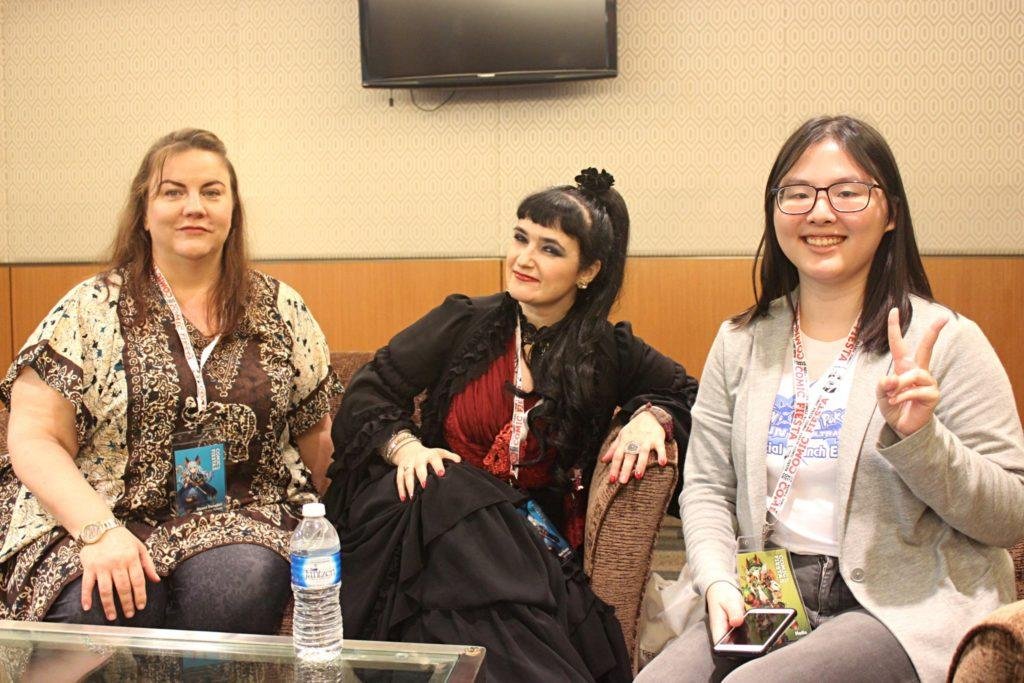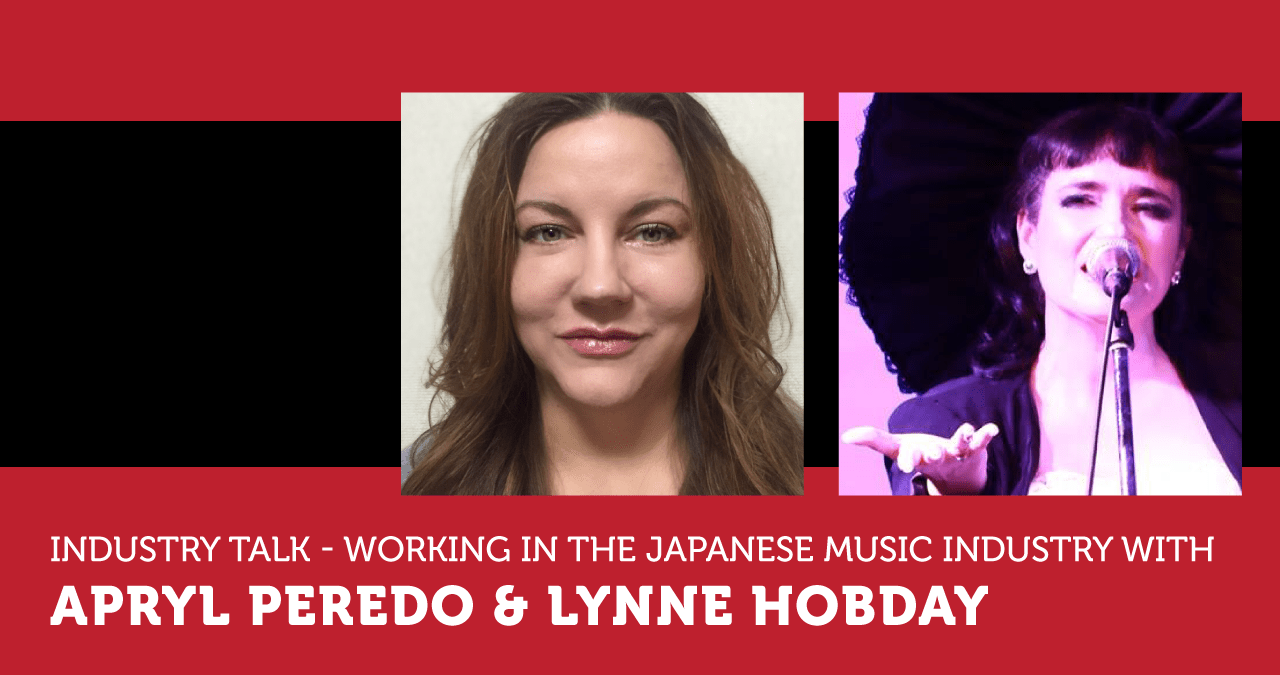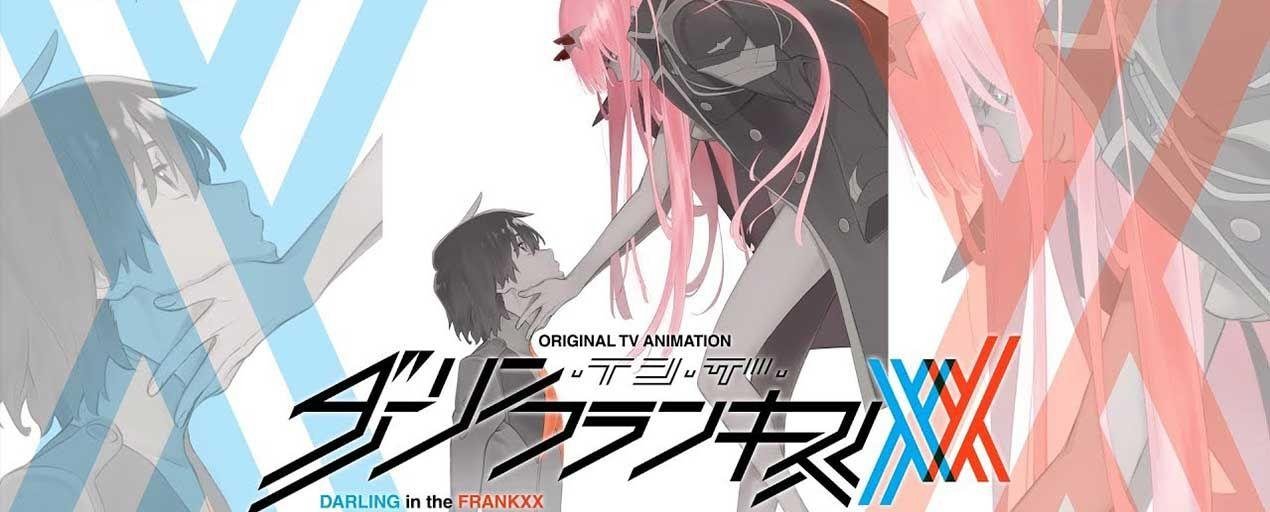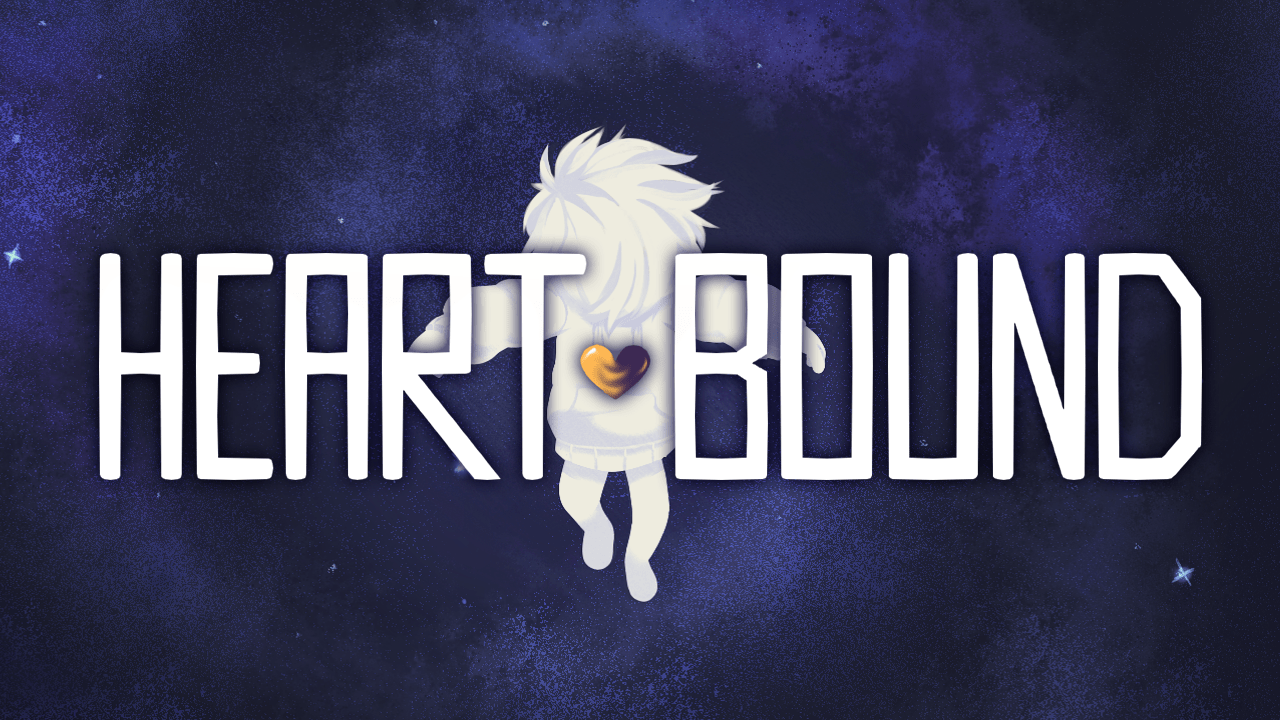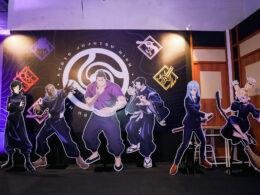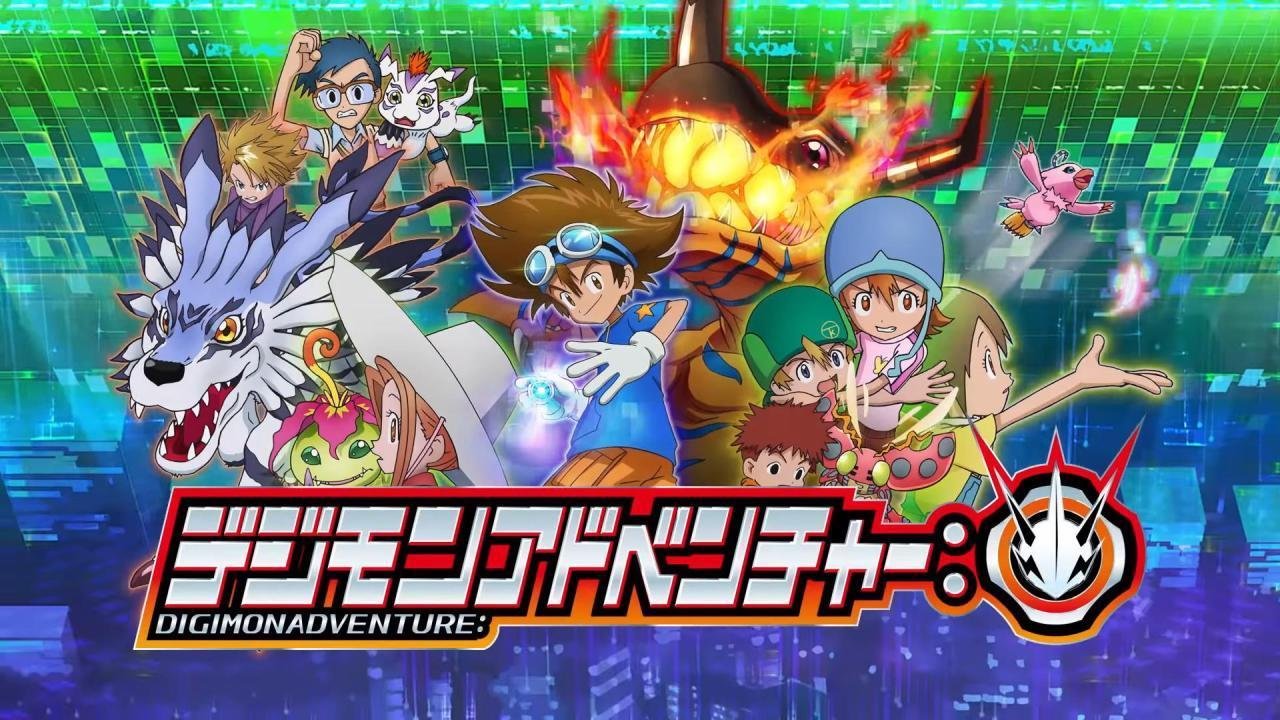During Comic Fiesta 2017, THE MAGIC RAIN team had the opportunity to talk to Japanese music industry experts, Lynne Hobday and Apryl Peredo! And wow, we really learnt a lot about the industry.
British-born, Japan resident Lynne Hobday is a singer/songwriter, lyricist currently working on the 5th SAILOR MOON musical. Having crafted lyrics for about half of the Japanese language songs for the newest edition, and written over 50% of the lyrics for 3 of the previous musicals as well as a Sailor Moon theme, she has also worked with known artists such as TMRevolution and L’Arc en Ciel/Hyde on their English language songs. Not only that, she has written and performed her own themed musical experience in Tokyo, following her character DUSTY PRINCESS.
Apryl Peredo, an artist manager living in Tokyo, and as a management/promotion consultant, has worked with various labels and music managers on promotion projects and planning for artists such as Miyavi, My First Story, SiM, Inoran, Man with a Mission, among others. She has been invited to speak at music conferences such as SXSW, mu:con, MIDEM, on the Japanese music industry and has also co-written English lyrics for several hugely popular anime themes over the past 5 years. Odd fact: She also has the same hair colorist, stylist and makeup artist as Go Ayano.
[Lynne Hobday – L; Apryl Peredo – A]
Q: As you were both raised overseas, upon moving to Japan, what were your first impressions of the country as a resident and did you experience any sort of culture shock?
A: Well, I actually thought Japan would be a little more technologically advanced than it is, but they do a lot of things on paper, everything’s on paper and they still use fax machines on a regular basis. In the US, you use a lot of Japanese electronics and when the delivery person comes, you’ll sign your name with a stylus which gives the idea that if we’re using Japanese technology this way here in the States, imagine what kind of future life it must be in the actual country. But coming here and finding out that we actually have to sign papers using a pen, it is a little bit shocking (laughs). But other than that, I think there weren’t any truly shocking experiences except for the paper overload (laughs).
L: When I first went to Japan 30 years ago as a student, I was so eager that I didn’t mind the culture shock. There were some things though that I found difficult, for example, things like how Japanese people drink their hot tea straight without putting milk in it and cold tea too! As UK isn’t usually that hot, we don’t really have cold tea so that was a slight culture shock. It was mainly food for me, but I’m perfectly alright with everything else.
Q: So what made you guys decide to go into the Japanese music industry instead of your local industry?
A: Well, we both respectively had experiences in our home countries. I was a radio DJ and sound engineer and I started doing music business in some festival system organization in the States. I left it for a little bit and went to other jobs, but then when I moved to Japan, I decided to get back into doing music.
L: I originally went to Japan to study Japanese because I liked and respected Ryuichi Sakamoto‘s music. So I went there to study for 2 years and when I went back to the UK, I got a job in the music industry. After that, I got sent over to Tokyo to work in the music industry and I’ve working on lyrics and singing ever since.
Q: Based on your experience in the music industry of both your home country and Japan, what do you feel are the major differences?
A: In Japan, customers like CDs more whereas overseas, listeners tend to like streaming, but I think the internal structure of how the music industry runs needs to be similar from country to country for us to be able to work together, but that’s just only the surface. Generally when it comes to business in Japan, they don’t want to get down to business right away. We often have three meetings to chat and get to know each other so that they build a kind of trust to work with you. Whereas in the States, it’s more of like ‘Hey, let’s make a deal!’ which is very immediate when it comes to business. To me, this is the main difference.
L: As for me, in Japan, you’ve got anime or game music which is pretty niche and has a life of its own that is separate from the rest of the music industry. I think that’s one of the most interesting part of the Japanese industry.
A: Oftentimes, anime music fans won’t go to regular music shows and regular music fans won’t go to anime events. They both don’t really meet, though sometimes it crosses over. We might have a band like Sekai no Owari or Man with a Mission which has music in anime, but specific anime fans won’t go to a Man with a Mission‘s concert and buy their CDs.
L: However, a lot of Japanese game composers are always very happy because the overseas fans tend to contact them more than the Japanese fans do, so it makes them realise that Japanese anime and games are a very major thing and carries much more resonance overseas.
A: Also, in Japan, there’s actually even a small segment of Pachinko music and there are composers that write specifically for Pachinko games. For example, I was talking to this singer the other day and she told me that she was working on some new projects which was to write 6 new Pachinko songs as well as the vocals. Those songs are very, very short like 30 seconds because it’s so noisy and chaotic, but there are people who are hired to do it. You don’t have events for it, but they will advertise this new Pachinko game songs and some people will rush and get in line just to use that machine because they want to hear the new music. What I don’t know is that whether those fans tend to be anime fans or game music fans or maybe completely separate. We haven’t determined that (laughs).
Q: (To Lynne) You’ve had the opportunity to work in such a well-known franchise, writing the lyrics for the Sailor Moon musicals. How did that start?
L: Well, I’ve worked with the director before on several projects. Currently in musicals, there’s this whole new genre which is the 2.5D musicals. Those musicals comes mainly from manga and they are put on the stage, some examples being Sailor Moon, Naruto and even games like Hakuoki. They’re very popular musicals and usually, it’s the director of the musical that would actually write the lyrics.
However, for Sailor Moon, especially since it has a long history, and the fact that it has separate numbers plus the occasional promotion events attended by the cast, the director wanted somebody that had the experience of writing songs rather than just songs for musicals. So I was asked if I could write in Japanese which I said yes, because I’ve been doing DUSTY PRINCESS as well as a few Japanese lyrics of the character songs for Prince of Tennis. So I started in 2014 and they did all of the manga arcs and translated them into 5 musicals. We’ve just finished the last musical in October 2016 which I’m sad about because it’s over. It was a great experience though.

Q: (To Apryl) It’s quite common for KPOP artists to venture into the Japanese market and oftentimes, we see them succeeding. Is it difficult for foreign artists to go into the Japanese market?
A: It’s actually not that difficult, but the band has to think of it as a long-term investment. For KPOP, I think it is a little easier for them because Japanese music already had JPOP idols, so that style of music with just singing and dancing, not playing music, and with someone else writing it, Japanese people are already used to it so you’ve already achieved 50%.
But the other thing is that KPOP bands are so wanted so they changed their style to more Japanese cute instead of Korean sexy by translating everything into Japanese and singing it that way. Not only that, the management companies have a huge amount of money, so they are able to, let’s say, rent a stadium, and maybe bring over a number of KPOP acts that are huge in Korea, put them here and spend so much on promotion. Alongside with the huge billboards and posters all over Shibuya which inspires people to come, there’s also a large Korean community in Japan which helps too. For a normal rock or pop band, it’s not hard to book them a venue, it’s just that they don’t have much money for promotions. So you just have to look at it long-term, like if I were the band, you got to think of long-term success like ‘I’ll need to go and make some fans, come back the next year and make more fans, slowly building up a fanbase’.
Q: Can you tell us a little bit about your creative process when it comes to writing lyrics? Is there a particular ritual that you have to do or a mindset that you have to be in?
A: When I’ve done ghostwriting with anime lyrics, for me anyways, I’m usually taking whatever the original songwriter thought would be good English and then I try to rewrite it into English that actually makes sense. When I do this, I usually ask them which character is singing, and then I go and quickly read a couple of volumes of the manga and check out that character to get their personality. Sometimes, I do say ‘This character will never say these kind of things’ or ‘This is a male character, so why is he saying something that’s kinda like girl chat?’. So when I do write for a rock or pop group, then again, I don’t do whole songs, just pieces (Lynne does!), I tend to evaluate the feeling that I get when I hear this group’s music and also the atmosphere that they want to give. So I’ll ask them, ‘When people hear your song, what do you want them to feel? Do you want them to feel like they are in love or sadness, so what’s the consensus here?’. Then, I might write a bridge or short chorus based on what they told me they want the meaning to be.
L: If it’s something that’s based off a manga for example, you read it and get an understanding of the characters. I’ve done a little bit of acting in Japan as well as written songs for stage plays, so it’s like getting the overall message. Also, because I write a lot of my own songs, and if they do know them, they all say to me ‘That was an interesting song, feel free to put in a bit of your own personality into what we’re doing’ which was really nice. But basically, if you’re writing for someone else, it’s more of what do they want.
For me, I’m not very good at writing regular rock or pop, but I’m good at writing songs that are more artistic and philosophical. Something with more depth is more my style, and the main theme of what I write is usually about something that comes through pain and struggle, and once you get through that, you see a beautiful world on the other side of it, something of that sorts. I also try to make it humorous as well, like when you’re going through a bad time, take a step back and try to laugh at yourself in a way, to make things fun for yourself and feel better. When you express everything you experience in life, both the good and bad in your writing, it also serves as an artistic spark, and you don’t waste any of that experience because you can write about it.
As I mentioned before, the reason I went to Japan was because I loved Ryuuichi Sakamoto‘s music so much and it helped me get through the day, and you know how in Twitter, users retweet lyrics that they relate to? Occasionally, you see people on Twitter saying ‘Oh, I love this line and it makes me feel better’ so yeah, I think the whole inspiration of writing is to just make myself feel better and hopefully let others feel better too and help people overcome any problems they might be facing.
A: Some manga writers write just to get some sort of social point across like Attack on Titans. The author has a specific point that’s really about Japan closing itself off from the rest of the world and not knowing how to handle the globalisation of the world, even coming into Japan. So he represented it as this huge titans – well, but the outside world isn’t so scary – but I mean that was his idea. If you were to take the manga into an anime and write the music for something like that, you have to think about what the manga writer wants to say so let’s try to make that feeling into a song to this idea of maybe being afraid of the new and how to approach it, how to grow. (To Lynne) Does Sailor Moon have a deeper meaning as well?
L: Good grief, well of course! While the Sailor Moon TV series may be remembered as bright and nice, it’s actually about death and rebirth, overcoming problems and fighting something that’s bigger than yourself, y’know sort of living to look after other people and it’s not just all about yourself. Yeah, I think that’s the popularity of Japanese manga and anime. It’s the sort of underlying theme that I think perhaps the Japanese society doesn’t have in live action fantasy.
A: And I think it also helps with all ages. As a younger child, you can just read or see it at the surface of the story like ‘Oh, they’re so happy and they’re a team’, but when you’re older, you can find the deeper meaning in it, this is why you have anime and manga fans from 4 to 100 year old because you can read the same thing but based on your age or life experiences, you see something else in it.
Q: Can you share with us some of the toughest challenges you’ve faced in your respective careers and how did you overcome them?
A: Well, I don’t know, is this where we start talking about sexism? I think for me, because I try to do artist management with Japanese bands, it’s not really an industry norm, but oftentimes Japanese bands falsely assume that only a Japanese person can manage them in Japan, so they’ll say things like ‘If we want help overseas like in America, we’ll tell you’. But I don’t live there and I can’t book you there.
So maybe the toughest hurdle is just convincing them that ‘Yes, I care about you as a band, I care about Japanese music, and I really do like it’. Because truthfully, a lot of people overseas don’t like the rock and pop in Japan. I mean they might like anime music or certain music but you don’t hear people saying, ‘Hey, one of the greatest rock bands ever is from Japan’. You usually hear them saying that they love a certain American rock band or maybe a British rock band but not so many people is saying that the best rock music these days is coming out from Japan, so convincing the Japanese band that you feel that way takes some time as they don’t really believe it at first.
L: For me, I think it’s just riding the waves – sometimes things go really well, but sometimes things don’t go well, and when you’re working with a lot of artists, it’s difficult to always find the right lyrics to go with them. Yeah, you have a lot of ups and downs, sometimes you get a lot of work, sometimes not really, but I’m not doing this just to be famous, I’m being creative because I want to do so for the rest of my life until I’m very old. So I think this is just sticking to something, whether it’s good or bad. Also, these days, I’m not so young (like I was thinking) and I started doing my own stuff about 4 to 5 years, you know who’s going to be interested so I think very often about the problems you perceive can be your own hurdles as well.
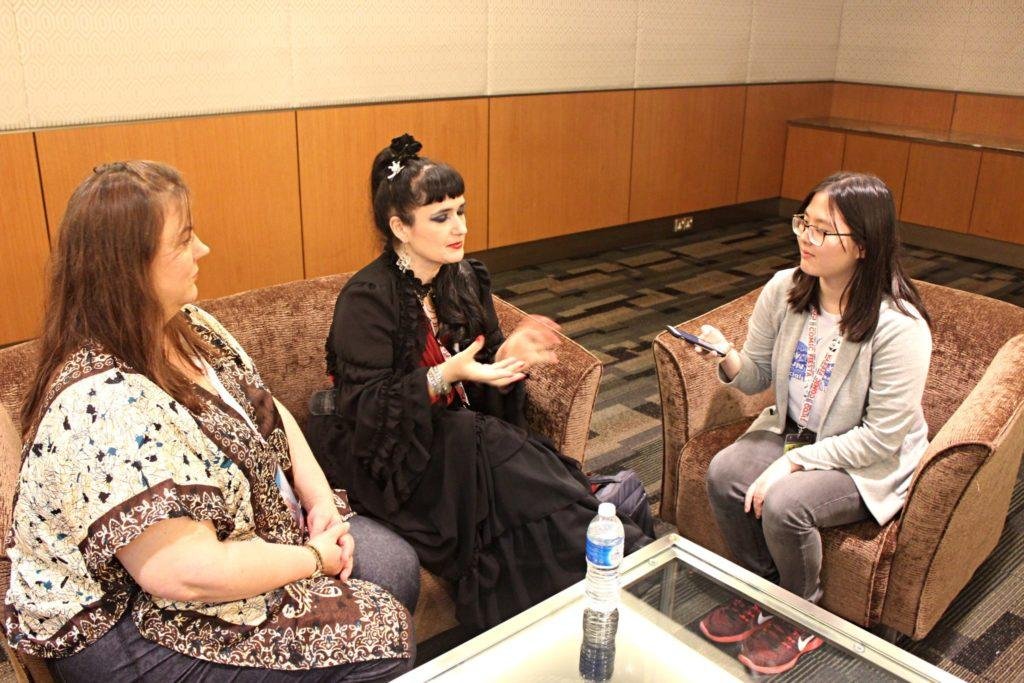
Q: You’ve both worked with plenty of well-known artists such as TMRevolution, L’Arc en Ciel/hyde, Man With A Mission, etc. How was it like?
A: In my case, I think probably 95% of the very well-known artists are the easiest people to work with ever, and I think this is because they’re technically proficient, they know what they’re doing and they’re confident with what they’re doing. They don’t have to prove anything by being unpleasant or making unreasonable demands which makes them much more easy-going. I worked with a guitar player that’s maybe the best guitar player in Japan, he sometimes supports Hatsune Miku on tour, but he has no problem playing in a venue that holds only twenty people, because he’s confident with himself. He’s like ‘Okay, it’s a huge venue and I expect this type of equipment and when it’s a small venue, I understand’. This type of people play because they care about music, and for them, whether it’s two audience members or 20,000, they’re doing what they love and they’re doing it the best they can.
Maybe the remaining 5% is very difficult because they want people to look at them a certain way or maybe they want a certain type of treatment. To me, I feel that they’re just not that confident in themselves and they’re still trying to be all ‘I’m the rockstar’. But for the most part, they’re very laidback people – for example, Miyavi is quite mellow as a human being. Japan is generally a polite and pleasant country anyway, so just culturally it’s strange to meet people who are unpleasant to work with, I think they’re mainly all pleasant.
L: It also takes a lot of effort to actually stay at the top and that’s why they’d have a lot to be upset about and since they’ve taken knocks in their lives, that’s probably why they’re so mellow because they’ve experienced a lot.
A: Yeah, I agree and certainly some top bands get all the way to the top and they take a hiatus, go back down and then go back to the top, and so on. So they know how’s the situation like for everyone they’re working with. Recently, I was talking to a singer and they wanted to book somewhere so as a manager, you’ll be like ‘Okay, how do you want to do this?’. Some crankier singers might go ‘I want to know exactly how much money is coming in so that you don’t get more than 10%, etc’.
But some singers will go ‘Let’s just split it 50-50 because I don’t want to do paperwork, I don’t want to deal with contract negotiation, you can do everything and I just want to know where to be, what to do, meet fans and make music so you just take 50%’. Some artists are like that because they appreciate whatever the managers or lyricists are doing for them and being a part of the process. They understand that the managers/lyricists/songwriters are not like some hired help, they’re a part that actually helps them grow.
Q: When doing lyrics translation from Japanese to English and vice versa, I understand that occasionally there are some expressions that work only in their mother language. How do you overcome that?
L: Basically, if you do a direct translation, it’s not going to look very pretty because in English, you need to have rhyming as well to make it sound nicer. So if you want it to sound good in English and make it go along with the melody as well, you have to bring out the melody through the lyrics that you write. When I do translations, we usually keep the nuance but change it a little. But I’d always say that this is not a direct translation, but it keeps the spirit of the lyrics which I think is more important than the actual word itself. It has to have a life of its own in English and it has to have a meaning.
A: And it also goes back to what kind of feeling do you want to express to the listeners. Do you want people to feel happy or sad or thoughtful? It’s best to just keep the nuance, and not necessarily the exact translation. I think this would actually be more difficult when you do translations for Japanese novels, because there is so much cultural nuance in the situation or place the writer is writing about. To translate it into English, you either have to remove some of it or you have to make the book longer because you have to explain and add some extra information in.
Q: Is there any advice you’d give to Malaysians aspiring to enter the Japanese music industry, be it as a singer or a producer, etc?
A: Well, I think that firstly, it’s key to develop your talents and skills, and maybe start from your home country. For example, if you want to be a band that’s successful in Japan, you start by being a band that’s successful in Malaysia, because you want that hometown base which can actually help you when you go overseas. This is because you can tie in the overseas expats from your home country in a new country. Obviously, Malaysians that live in Japan will have Japanese friends so if it’s a band that people like in Malaysia, and they may invite their Japanese friends to come which will actually help a lot. But it also comes from just if you wanna be a band or make music, it has to come from your heart and not just because you want to be famous in Japan. You have to have some reason for making music that you can do it anywhere. So be a band at home then only move on overseas.
L: It’s a commitment to your dream, whatever it may be. Sometimes, it’s good to listen to the voice in your heart and sometimes, you have to sit down and figure out if it feels right to do what your voice inside your heart tells you to do and oftentimes for me, it’ll be right.
With that, we’d like to thank Apryl and Lynne for the extremely educational session! We hope that with this interview, you’ll be able to understand and learn more about the Japanese music industry.
Like what you see so far? Subscribe to our newsletter by entering your email here!
